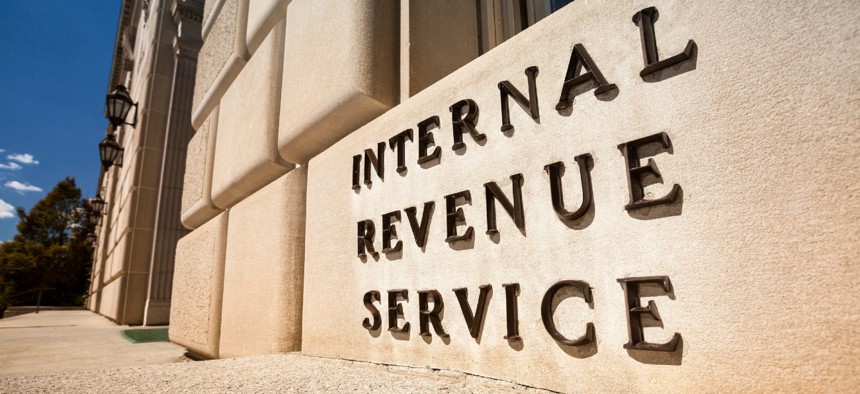
Treasury Department Secretary Janet Yellen required the plan immediately after President Biden signed the Inflation Reduction Act last August. Pgiam/Getty Images
Biden Administration Misses Its Own Deadline to Detail Inflation Reduction Act Spending at IRS
The plan will spell out how the tax agency will spend its $80 billion cash injection, including its hiring proposals.
The Internal Revenue Service on Friday missed the Biden administration’s own deadline for detailing how it will spend its $80 billion cash infusion, punting on a plan that is set to spell out its implementation of the unprecedented funding surge.
Treasury Department Secretary Janet Yellen required the plan immediately after President Biden signed the Inflation Reduction Act last August, giving IRS six months to deliver a spending plan. That set up a deadline for Friday, which IRS has failed to meet. The requirement was originally included in the text of the bill, but was stripped out for procedural reasons.
“The IRS has been working to prepare the Strategic Operating Plan requested by the secretary,” the agency said in a statement. “The IRS expects to deliver the plan to the secretary in coming weeks.”
In her August memo, Yellen said the IRA money created a “monumental opportunity to transform tax administration in this country” and implementing the law would “require an all-hands on deck approach from the dedicated employees at IRS.” She called for the plan to detail how IRS would eliminate its unprecedented backlog, improve taxpayer services, overhaul its antiquated IT systems and hire a sufficient number of employees to keep pace with attrition.
Yellen instructed IRS to work with Treasury’s deputy secretary to create timelines for each operational initiative. The agency has 10 years to spend the funds and Yellen requested information on milestones throughout that horizon, to include metrics for areas of focus—such as personnel growth—and targets for each year.
“This kind of planning is crucial, so I am directing that such a plan should be delivered to me six months from today,” Yellen said. “This operational plan is key to ensuring the public and Congress are able to hold the agency accountable as it pursues needed improvements.”
Then-Commissioner Charles Rettig told Congress in 2021 he had already spent months developing hiring plans so IRS could hit the ground running as soon as new funding was approved.
“We don’t plan to wait six months to implement what Congress provides to us,” Rettig said. “We will be ready.”
The agency has already started spending its new money, citing the cash infusion when it announced in October a hiring spree for 4,000 customer service representatives. It has taken additional steps to prepare for significantly more hiring. IRS has signed two contracts to assist with recruiting and background investigations, while OPM has provided expedited hiring authority for up to 10,000 Taxpayer Service and Enforcement positions annually through 2027.
In her memo last year, Yellen noted she would approve funds for short-term improvements ahead of the 2023 filing season but that plan was a “prerequisite for expending these resources more broadly.”
“I think there is value in thinking carefully over the course of the next few months how work should be prioritized and sequenced to achieve our goals,” Yellen said.
IRS is awaiting the confirmation of its commissioner-designate, Danny Werfel, who Biden appointed to the post late last year. In a confirmation hearing before the Senate Finance Committee on Tuesday, Werfel promised transparency on the spending plan.
“I agree the plan that is put together should allow you, this committee, and the public to connect the dollars from the Inflation Reduction Act to the various activities and investments,” Werfel said. “I really want to earn this committee's trust. As a former budgeteer, I think I will earn this committee's trust by putting together a very clear plan for where this money is going.”
While Yellen mentioned only backfilling future attrition in her memo, the funds are expected to allow IRS to significantly grow its workforce.







